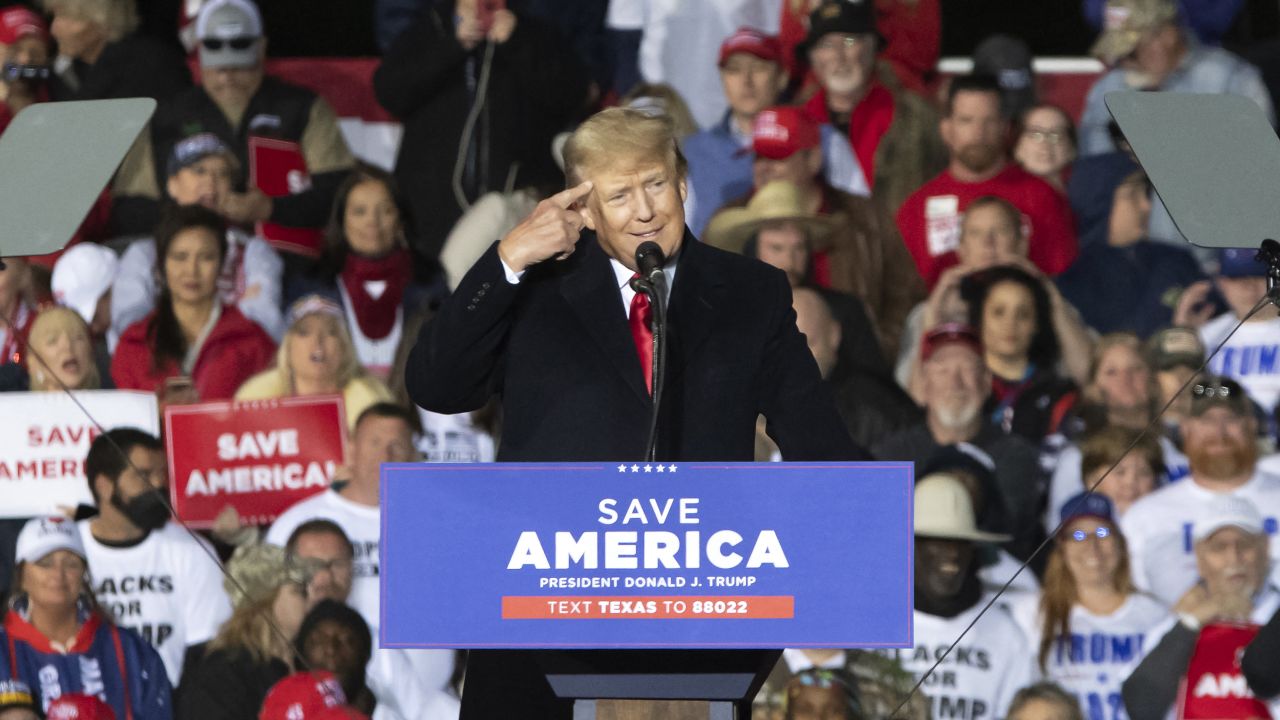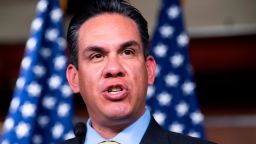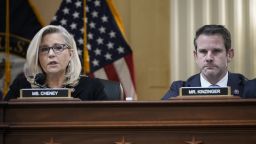Donald Trump’s pledge to pardon January 6 rioters may help fire up his supporters, but several defendants facing federal charges say they no longer believe the former President’s promises.
Even defendants who are holding out hope for clemency are clinging to a false hope. Most of their cases are likely to be resolved in court long before the 2024 presidential election. This week alone, following Trump’s comments, seven people have cut guilty plea deals.
“What we have learned from the year that has gone by, is that my clients, apart from their families and their lawyers who are representing them, is that no help is coming,” Joe McBride, a lawyer representing five riot defendants, including ones in jail, told CNN.
“It is us, and we’re going to have to make do with what we’ve got,” he added.
The nationwide manhunt for the hundreds of rioters who descended on the US Capitol has become the largest criminal investigation in US history. Nearly 735 defendants, almost all of whom have professed their support for Trump, are facing charges for joining the attempt to stop the certification of Joe Biden’s electoral college win in the 2020 election, ranging from minor trespassing offenses, to assaulting police, to seditious conspiracy. The probe has also led to an unprecedented government crackdown against right-wing extremist groups, including the Oath Keepers and Proud Boys.
In the past week, Trump said the January 6 defendants are being treated unfairly, while teasing a 2024 presidential run and suggesting he would pardon rioters if he were reelected.
“If it requires pardons, we will give them pardons because they are being treated so unfairly,” Trump said during a Texas rally over the weekend.
Trump repeated the promise in an interview with Newsmax on Tuesday, saying, “I would absolutely give them a pardon” and calling the punishment “20 times out of proportion. These people are being persecuted.”
Trump had made similar promises back when he was still serving as President – with some January 6 rioters jailed for the 14 days at the end of the presidency. Then too, Trump didn’t come through, nor has he helped January 6 criminal defendants with their legal bills.
“He could have pardoned some or all of them before he left office between January 6 and January 20 last year,” defense lawyer Jonathon Moseley, who represents accused Oath Keepers, said on CNN’s “New Day” this week. He pointed to earlier commitments from the former President including that he would help defendants with legal bills.
“I’m not sure exactly what people think he should have done in every case, but there is a feeling he could have done more.” Moseley said.
Lawyers who represent multiple, high-profile people charged in the sprawling January 6 investigation aren’t changing their legal strategies because of the former President’s promises, according to the lawyers, who understand a pardon that is years away is not a viable approach to cases in court now.
And for even the highest profile cases for defendants who maintain they are not guilty, their trials would be set for the coming months. That means that if convicted, judges could be handing down steep sentences by the end of the year – and several of the defendants facing more serious allegations related to January 6 are already sitting in jail as they await trial.
“The comments by Trump are, for J6 Defendants, more than a day late and a dollar short,” Al Watkins, the attorney who represented Jacob Chansley, the so-called “QAnon Shaman,” said this week in an email. Chansley had made a public plea for a pardon while Trump was in office, then pleaded guilty this fall, telling a judge he was wrong to have broken the law by taking part in the insurrection.
Witness tampering?
Still, Trump has managed to direct political conversation toward his supporters who stormed the Capitol last year – with two House Democrats investigating the Capitol attack saying they believe Trump could be tampering with witnesses.
Though pardons could only apply to criminal defendants, and nearly all defendants who are charged at this time were at the US Capitol on January 6, critics of Trump have raised the possibility he could be trying to buy the silence of close advisers who didn’t participate directly in the insurrection. The House select committee is seeking information from rioters, as well as Trump confidantes and supporters. There’s little indication at this time that the Justice Department is targeting the advisers closest to Trump with investigations that would touch on his actions, though the Department has charged Steve Bannon and is considering whether to charge ex-White House chief of staff Mark Meadows with contempt of Congress for failing to testify under subpoena in the House investigation.
On Friday morning, Rep. Elaine Luria, a Democrat on the House select committee, said on CNN’s “New Day” Trump’s comments “could certainly color” criminal defendants who are choosing between sharing facts and avoiding consequences.
“He just literally keeps restating these things very publicly and openly and to reaffirm … what he wanted the outcome to be,” Luria said. “The more he does this, the more he’s making a case against himself.”
Elie Honig, a former federal prosecutor and CNN legal analyst, said the specter of future pardons could reduce a person’s willingness to cooperate.
“If you think you can get the ultimate sentence reduction without cooperating, you will opt for that. Now it’s more complicated in this scenario,” Honig said.
“But again, someone who is thinking more long term could think, well, now I’m going to stretch things out,” Honig added. “Now I’m going to not cooperate and hope that if I do get sentenced to prison it will get cut short, if Donald Trump becomes president again.”

But at least one lawyer has said that Trump’s comments are likely to influence rioters, potentially making them less likely to accept a plea deal or to cooperate with the Justice Department’s investigation.
“I think the former president continues to motivate, to impact, to suggest the actions of those who support him. He did on January 6th, and I don’t think anything has changed since that time” said attorney Robert Jenkins, who represents both members of the Proud Boys and the Three Percenters, on CNN’s “New Day” this week.
“He is certainly putting his fingers on the scales,” Jenkins added.
And Shanlon Wu, a criminal defense attorney who represented a key cooperator in the Robert Mueller investigation, at a time when Trump was wielding his pardon power to keep targets of the investigation uncooperative with Mueller and loyal to him, said times have changed.
“It’s different when he was the President,” Wu said, adding that Trump’s comments have been too vague, and not directed to any specific individual, to constitute real witness tampering.
Waiting years for help
The idea that Trump could pardon January 6 defendants doesn’t even make logical sense to some of the attorneys.
It’s so far out of their calculations, Trump’s pardon comments barely even registered in the chatter on an email list used by the January 6 defense attorneys, sources familiar with the group told CNN.
Defense attorneys representing January 6 defendants are looking closely at timing as their clients head to trial or consider plea deals – and pinning hope on a theoretical Trump return to the presidency three years from now isn’t feasible.
“The next election is still three years away, so it’s kind of premature to say I hope Donald Trump gets elected and grants pardons to my client,” Guy Womack, who represents three January 6 defendants, said.
One of the rioters, Edward Jacob Lang, in jail now awaiting trial, said recently he felt “completely abandoned by the political hierarchy.”
Speaking to right-wing personality Stew Peters in a jailhouse interview last month, Lang said, “Where are our leaders standing up? Our congressmen, our senators, our president? Trump, where are you?”
“We’re rotting in jail because we stood up for what you told us to stand up for,” he added.
Defense attorneys instead are aiming to slow down their cases – without 2024 in mind specifically. Some believe their clients should wait longer before cutting plea deals with the Department of Justice, because prosecutors still are demanding they agree to harsher charges and possible punishments.
And others have said they believe cases could be dropped if evidence emerges to support right-wing theories that the insurrection was plotted by the FBI – a conspiracy authorities have repeatedly shot down.
Some January 6 defendants have focused more on publicly campaigning for more leniency toward them before trial, misleadingly calling one another political prisoners.
Richard “Bigo” Barnett, who was photographed with his feet up on a desk in House Speaker Nancy Pelosi’s office, said in court this week he is growing his goatee out until “all the J6ers are free.”
Barnett, his lawyer McBride told CNN, believes that Capitol riot defendants are not receiving due process.
Despite their skepticism on Trump coming through for defendants, almost all of the attorneys CNN spoke to said they would still ask Trump for pardons for their own clients if he returned to office. Many are also asking for Biden to consider pardoning defendants who trespassed onto the Capitol grounds but say they were nonviolent.
“I would hope that any president, including President Biden, would grant pardons” to people who walked in the building and quickly walked out, Womack said, referring to one of his clients, Texas realtor Jenna Ryan who was charged with a misdemeanor and sentenced to 60 days behind bars.
Ryan publicly asked Trump for a pardon shortly after she was arrested last year, and he didn’t deliver.
Womack noted this week, speaking to CNN, that Ryan isn’t angry Trump didn’t pardon her before he left office.
“Everyone facing criminal charges would like to receive a pardon and not have to undergo trial,” Womack said. “I don’t think there was anything done wrongly there. And I didn’t expect the President to even address it, and he didn’t.”











